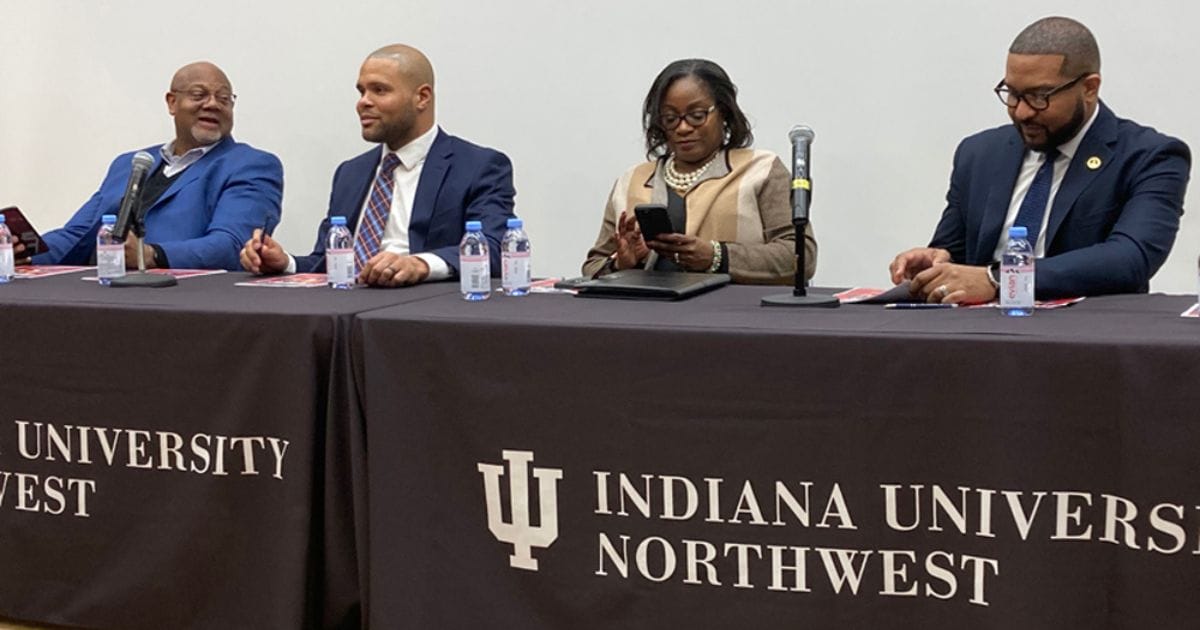L-R: Mayors Rod Roberson, Ron Morrell, Angela Deuitch, and Eddie Melton
Four of Indiana’s 8 Black mayors, including Gary’s Eddie Melton, took the stage Wednesday, February 21st at Indiana University Northwest to talk about access to jobs and economic opportunities – what’s working and what isn’t in their Black communities.
The Mayors Conversation, one of the events that took place during this year’s Black Labor Week, drew a large audience to the forum that extended an invitation to Indiana’s largest ever contingent of Black mayors. Now in its 13th year, Black Labor Week spotlights the work of labor unions and the labor union movement.
“Our mission is to display the parallels between the Black community and labor, and to make Black labor a priority,” said Ephrin “E.J.” Jenkins, Executive Director of the Black Labor Week Project Inc., the non-profit organization he founded in 2012.
Indiana’s number of cities with Black mayors stood at one for nearly a half century after Richard Hatcher’s 1967 win in Gary. East Chicago became the 2nd city to have a Black mayor with Anthony Copeland’s win in 2010. The forum drew Mayor Rod Roberson from Elkhart, the 3rd city to elect a Black leader. He was first elected in 2019.
In the 2023 election season, the number of Black mayors in Indiana grew to eight – seven Democrats and 1 Republican.
Michigan City Mayor Angela Deuitch is in her first term. Her city is 28% Black. “Historically, where I live, Black people are not part of unions; few are on union projects. I have been working with union leaders to raise awareness in the Black community,” Deuitch said.
As a city council member, a responsible bidder ordinance she sponsored was passed.
As mayor, she created a Director of Educational Workforce, and labor representation has been added to the city’s Commission on the Social Status of Black Males and its Urban Enterprise Zone.
Deuitch is encouraging high school students and young people to take advantage of opportunities at the area career center that can give them access to union jobs.
You can’t fix a system in 51 days that’s broken – that hasn’t ever included Black workers, Deuitch said. They need advocates, resources and opportunities from local government, local companies, the school district, and community leaders.
“We have things on the books, but there are no teeth. You need people in local government to have that battle with local companies,” Deuitch said.
There is also work to do within the community, now that Michigan City has a pipeline of public works projects they didn’t have before, the mayor said. “The unions want us. I always talk about grades. We have to make sure our kids want these jobs. I don’t believe we are making these jobs sexy enough.”
“If you level the playing field, African-Americans will do well,” said Elkhart Mayor Rod Roberson. “Since I’ve been mayor, we have the highest ever number of Blacks and Latinos employed by the city.”
Elkhart is 13% Black, 28% Latino, 7% mixed race, some Asian-Pacific, and the remainder white.
“When I walked in as mayor, one of the city’s departments had 8 employees with the same last name. That’s what happens when the department heads do the hiring,” he said.
Now, the city’s hiring stresses “cultural competency,” as Mayor Roberson put it – “where everyone has a seat at the table.”
“I hired a talent acquisition person. I made sure my department heads saw resumes from a pool of folks, from me and from others in the community suggesting people for the job,” Roberson said. “Pushing cultural competency was difficult in a community that is primarily white with a strong Republican base, but we are now seen as equitable employers.”
“I believe our future is not wrapped up in our blackness. It’s wrapped up into how well we are able to perform as a community,” Roberson said. “I ran unopposed in the last General Election. I’m the only mayor in Elkhart history to have done that.”
Mayor Melton pointed to IU Northwest’s Arts & Sciences building as example of what’s not working for Black job seekers in Gary. Its construction during 2015-17 saw protests citing lack of local and minority hiring on a project built with state funds.






